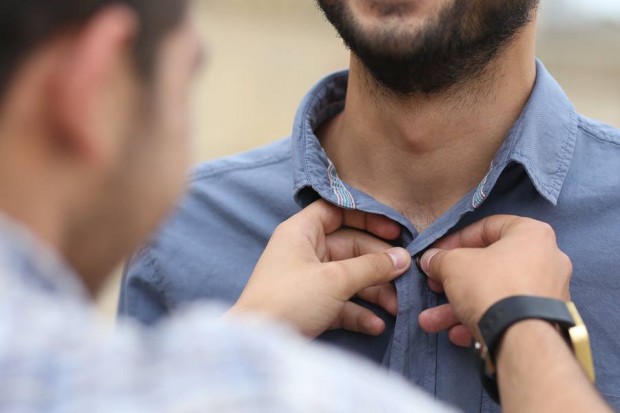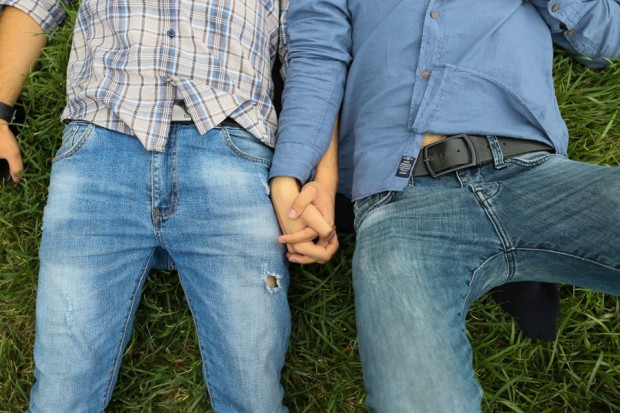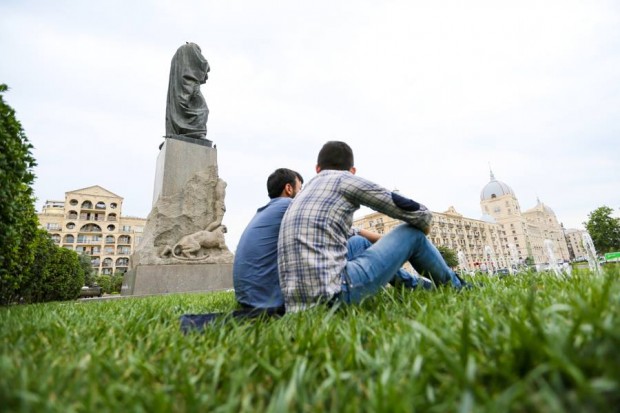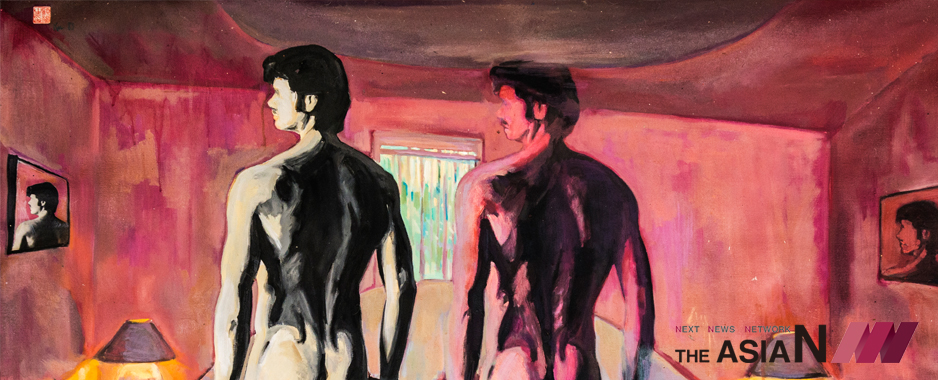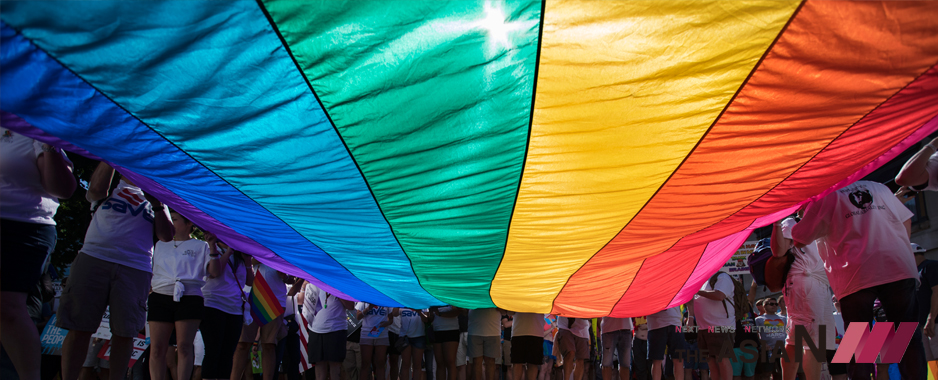
Gay in the South Caucasus: LGBT life in Armenia, Georgia and Azerbaijan
Armenia
“I lost so many friends…”
Karen Arakelyan (note: name has been changed for purposes of anonymity) for years fought against himself, trying to change the truth known only to him. But as a result, it became impossible to live with this secret, and he decided to come out:
“I’m glad that I took this step. Now, I live without hiding myself. I am who I am… “, – says the 23-year-old computer programmer, Arakelyan, not without a hint of regret audible in his voice while talking about friends that he has lost during the process of coming out. But down in his heart, he is calm and feels that coming out was the right decision.
Karen says that during his studies at Yerevan State University, he had many friends. When he told them about his orientation, his friends gradually moved away from him.
“When I told my secret to my close friends, they stopped talking to me. None of them are close to me anymore. I’ve lost so many friends… When they see me on the street, they don’t even stop to say hello…”
2012 attack on gay night club
In Armenia, members of the lesbian, gay, bisexual and transgender (LGBT) community face discrimination. Often their rights are violated by society, family and the government. The majority of Armenian society considers them ‘inappropriate’ or ‘perverted’, teasing them, refusing them communication and a spot in the life of families, schools and the army.
They are often denied jobs based on their sexual orientation.
Back in 2012, in the center of Yerevan, a club considered a meeting place for local members of the LGBT community, “DIY Club”, was blown up. The explosion of the club divided society into two groups: those who defended the attack against the club and against homosexuals in general, and those that were outraged by the blatant display of intolerance and hatred. Spokesman for the Republican Party of Armenia and deputy chairman of the Armenian Parliament, Eduard Sharmazanov, approved of what happened at the time.
According to the executive director of the organization “Public information and the need for knowledge”, Mamikon Hovsepyan, the problem lies within the fact that society does not have the necessary and correct information. Instead, it is their imagination that works.
NGO “Public information and the need for knowledge”, founded in 2007, offers psychological, social and legal assistance to people from the LGBT community.
Mamikon would like to be a parent
Mamikon Hovsepyan said that the original founders of the organization have already left the country. They were forced to live a double life, and were afraid to be more open to the public. Mamikon has also left Armenia, but after a while decided to come back. He realized that his place is here [Armenia]. Mamikon lives openly, everyone knows him, and relations with his family are tolerable, even if at times he senses some negativity from their side.
“I came out easily, but for many people it is very difficult. My parents are smart people, and I was able to talk to them, but they still are under public pressure. The relationships that I have with them are good, but I do not think they accepted me. I feel their negative attitude towards my orientation. My parents had dreams, plans for the future…saw their children and, without asking them whether they wanted to be involved in these plans or not, started down their own path. When these plans start to crumble, one comes across a deep sense of disappointment. The same is likely to happen to my family”, says 33-year-old Hovsepyan.
Mamikon said that he has his own family, and that they would like to adopt a child. But even if it was possible under the law, you would have to be very brave to do such a thing in Armenia.
“Especially for someone like me. Everyone knows that I am gay. It will be very difficult for the child as well. That’s why I don’t dare to do it. Someday, if I am not leading such an active role in society, or if I live in another country, I will definitely adopt children…”
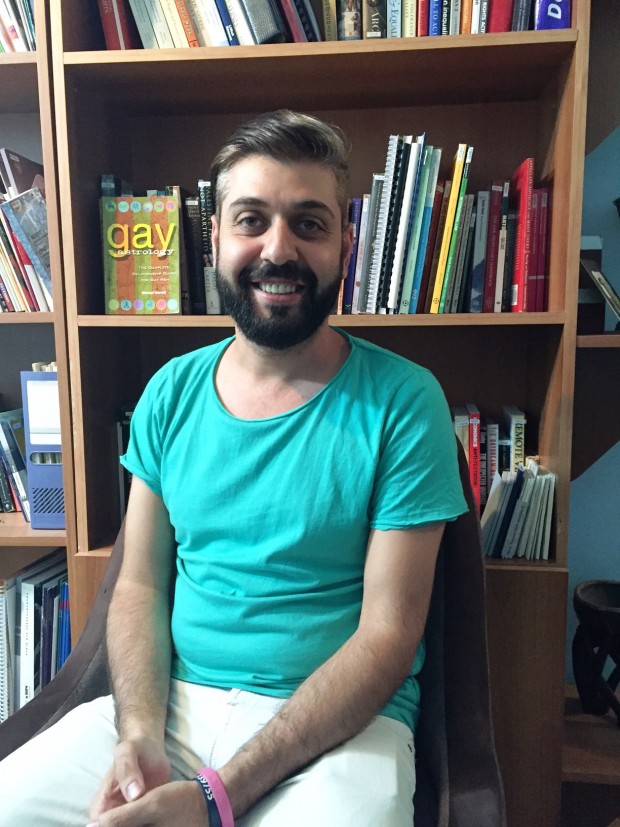
Mamikon is his parents’ only son
Armen’s mother invited a priest to their home.
18-year-old Armen Karapetyan (note: name has been changed) says that at age 12 he realized that his interests did not entirely coincide with those of his friends.
“You begin to understand that you are indifferent when it comes to girls, and that you like boys. But then one day you’re told that a guy can not love another guy. And you’re amazed: in this case, you wonder: why am I like that? Gradually, you realize that you can not tell anyone about this, and that it is necessary to keep it a secret for the rest of your life”, says Armen.
When he told his parents about his orientation, his father said that it would be better if he were a terrorist. His mother called a priest the next day.
“The priest who came to our house said that I was possessed by a demon. They decided to pray for me and sprinkled holy water on me. They didn’t kick me out of the house because they would not be able to explain that to the relatives.
People at the university love me, have already gotten used to my hairstyle, but they do not know about my orientation. I do not want my classmates to found out about it.
Soon I will have to go to the army, and during the medical examination in the military commission, I will tell them that I have…’problems.’ In the army, homosexuality is considered a psychological problem “, – says Armen.
Army is “hell for gays”
The army is a place where people from the LGBT community are subjected to terrible discrimination. Karen Arakelyan has experienced it all himself, when he served in the army.
“They laughed at me. I was ordered not to leave my room. No one would eat with me. They forbade me to enter the dining room, communicate with others. Food was brought to me by a librarian. I was not allowed to use the shared toilets …”, says Karen, who was drafted into the army while holding unto his secret.
Succumbing to the fear that his secret would eventually be revealed, Karen voluntarily confessed to the battalion commander that he was gay and asked to be given a psychiatric consultation. After the examination, Karen was sent back to the military unit with doctors saying that he has no psychological problems. Meanwhile, in the military unit, everyone had already found out about his sexual orientation.
“My phone was not silent for months. Threat after threat. Comrades on service would call me and say “hey you, we ate at the same table, we slept in the same room. Now, whether it’s true or not, you will pay for everything. If we will see you anywhere, you’re dead.”
Even the chief of the regiment called me “goluboi” (light blue, in Russian, a slang term for homosexual) and told me that I was spoiling and ruining other boys”, says Karen.
My mother said that killing people like me would not be enough.
Karen says the most difficult moment of his life was the day when his parents found out his very bitter truth:
“I was so ashamed. My mother wept, and slapped herself in the face. My father was shocked. Mom said she wouldn’t throw me out of the house, but that I needed to know that after this, many things would change in our relationship. And indeed, we do not communicate like mother and son anymore. After the events in Orlando, my mother said, ‘well done’, and that the same thing should be done in Armenia. It doesn’t matter to her that her own son is gay. My father was more tolerant.”
Coming out – freedom or unneeded burden?
Lilit Avetisyan, a psychologist at LGBT rights organization PINK (Public Information and the Need for Knowledge) says that many people do not reveal their true identities to society and continue to live “calmer” but also more secretive lives, which in turn can lead to isolation and uncertainty.
Some LGBT people choose to come out of the closet, and speak about their sexuality, which frees them from this inner burden, but in turn produces pressure from society and the outside world:
“There are young people under the age of 20 years whose families are more tolerant, and they are able to enter into a dialogue with their children. I’ve had parents come to our offices to talk with me directly with their children. But still, there are unfortunately many who reject their children altogether…”
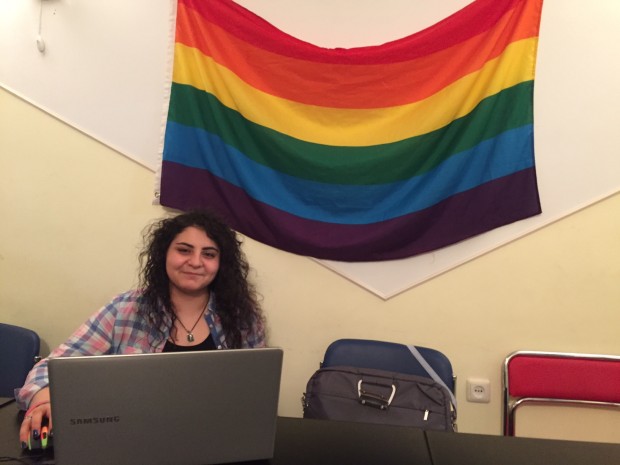
They marry without experiencing passion or attraction
According to the psychologist, many LGBT individuals will marry without really having any attraction for the opposite sex. They’ll even have children and build a family:
“Most of them are men. At the same time, they continue their relationships with their same-sex partners. In our culture, it is assumed that the husband will be unfaithful anyway – what’s the difference if a woman’s husband is with another man or another woman? Most wives will simply turn a blind eye. Here, women are subjected to violence because men do not treat them as a partner, with whom they intend to build their lives. They see women as mothers of their children, continuing to live their own lives.”
Unemployment – the second misfortune of the LGBT community
Mamikon Hovsepyan, director of PINK Armenia, said that many LGBT people face unemployment issues, but the organization tries to assist them to find work:
“Many work in the service sector. There are people who work in the highest positions, but they are closed and homophobic. They speak against the LGBT community in order to save their own skin, “- says Hovsepyan.
Karen Arakelyan is convinced that he will have similar problems with finding a job. The country is small, and information about him has been spread. He sees no way out of it. For him, the only solution that he sees is to leave the country. Karen is looking for educational programs through which he would be able to leave the country, at least temporarily.
“Every day I experience pressure, discrimination, conflict. I have this complex that I’m guilty of something. If I am gay, that means that I am not a member of this society. Why do I have to leave the country, where my family is, where I’ve spent my childhood, my past? I have to go to a country where I will be understood, and not threatened “- says Karen.
Laws do not help if society is not ready
Mamikon Hovsepyan is certain that the attitude of society can only change through knowledge:
“I’m talking about proper sexual education. Today, teachers in Armenia while speaking about sexual diseases do not even utter the word “condom”. There is no knowledge about sexuality. The term barely exists in Armenia. There are even people who say that they have no sexual orientation. The society has no knowledge and hearing the word ‘sexuality’ makes them horrified, “- says Hovsepyan.
However, he hopes that it is possible to bring about change in Armenia. He sees Malta as an example, where ten years ago the situation was even worse than it is now in Armenia.
“Laws do not matter if society is not ready; although laws do give some a sense of protection…but this is not always effective”, says Mamikon Hovespyan.
Laws concerning LGBT rights vary allover the world, ranging from legal recognition of marriage, to imprisonment and even the death penalty as punishment for homosexual relations or so-called “propaganda.”
In 2013, the Armenian Police presented a bill, “On the prohibition of non-traditional sexual relations and the promotion of LGBT amongst youth”, but it was not passed.
Like other Christian confessions and traditional religions, the Armenian Apostolic Church does not accept LGBT people. In today’s Armenia, civil unions and same-sex marriages are not recognized by law.
Georgia
Slim, blond, well – dressed with a small pony tail on his head, 26 – year old Zura (note: name has been changed for purposes of anonymity) works as a bartender in a cafe – club in Tbilisi. He was born and raised in the city of Kutaisi, where, as in much of Georgia, the subject of sexual orientation has always been a taboo topic. Somewhere around the age of 12, Zura noticed that he was more interested in boys than in girls:
“I was in a complete information vacuum. The most painful thing was that for many years, I had thought that I was diseased, and that I was the only one who had been born this way. I didn’t know who I could tell. At that age, for me, this topic was very hard. I tried to hide myself, and had little to no contact with anyone. My last four years at school were a personal hell for me, and it was only at university that I finally learned that I was not, in fact, diseased. And that I’m the same as everyone else.”
Remembering the difficult years at school, Zura gratefully talks about two of his closest friends: Khatuna and Lika. These were the first people to whom he opened up and talked about himself. They supported and defended him.
“Without them, I would not have survived. Almost every day I was ridiculed, humiliated, mocked. I can not say that I was beaten up, but there was a constant psychological pressure. “
But one day, Zura ended up in a fight after Zura started calling one of his fellow classmates on whom he had developed a crush. All he wanted to do was reach out, and communicate:
“I called him. I admit, it was provocative behavior. I started talking to him in a woman’s voice. The next day, I was beaten up at school. Of course, after this case, it got really bad. They’d come up to me at school and say: ‘so, this is the girly – girl…’
Despite the fact that I had my friends, their protection was not always enough. I was never supported by the teachers, either. I could feel their silent aggression, and that they did not like me”, recalls Zura.
Family affairs
Zura is not surprised by the fact that people from the LGBT community are treated badly by society. After all, he grew up in the same environment, and knows that homophobic attitudes are developed early on by the family unit. Fathers teach their sons to beat up a person if it is obvious that they are gay. In Zura’s family, the first one to find out about his sexual orientation was his older sister, who read a conversation between him and his boyfriend on Skype:
“She was hysterical, shocked. She told our mother who has since then strategically chosen to keep quiet about the subject. No, I was not kicked out of the house as many other parents would have done but we are simply not talking about the issue. Five years have passed, and after all this time the subject is still a taboo in our family. “
Zura is aware that he will not be able to bring a boyfriend back home and introduce him to his mother for a very long time. Even if his mother accepts it, the society around her, relatives and neighbors, will not be able to understand.
“I do not want to complicate my mother’s life. She belongs to the Soviet generation, and at that time it [homosexuality] was generally considered a criminal offense. Most of the media in Georgia is homophobic, so my mom has no support and no help to be able to process all of this. I know people who are gay, but in order to fit into society they get married, have a family, children, and secretly meet with their boyfriends. Personally, I wouldn’t like to lead a double life like that.“
Every truth carries new and not always pleasant consequences with it. Zura has basically had to start a new life, make a new circle of friends and acquaintances.
“Because of being gay, I’ve lost a lot of friends, especially friends from childhood. When you realize that they’ll never understand, you simply have to walk away. My family knows that I’m gay. No one has ever cursed me for it, but I’m no longer welcome at family gatherings and holidays. I understand that, for them, I have ceased to exist.” says Zura
Better to be gay in Georgia than in Azerbaijan
“I would like our society to become more tolerant, not only in relation to the LGBT community, but towards all minorities. I support the idea that the education system should also step in. Gender should be properly explained at school in accordance with the age of students. We live in a country where the authorities, the police and the church are homophobic, and where politicians make homophobic statements to score points for themselves. We feel completely helpless in our country. I remember, on May 17th of 2013, there was a cordon between the angry mob and the LGBT community and the police did nothing to stop it. They simply gave up, saying: “what, are we supposed to defend these fags?” Our police is more interested in religious norms rather than in the enforcement of the law”, said Zura.
It should be noted that Georgia in comparison to the other three republics of the South Caucasus is considerably more tolerant towards the LGBT community. The annual tolerance ranking of the organization ILGA Europe (the European Branch of the International Lesbian, Gay, Bisexual, Trans and Intersex Association) showed that in 2016, out of 49 countries, Georgia ranked number 30. Armenia and Azerbaijan ranked 47 and 49 respectively.
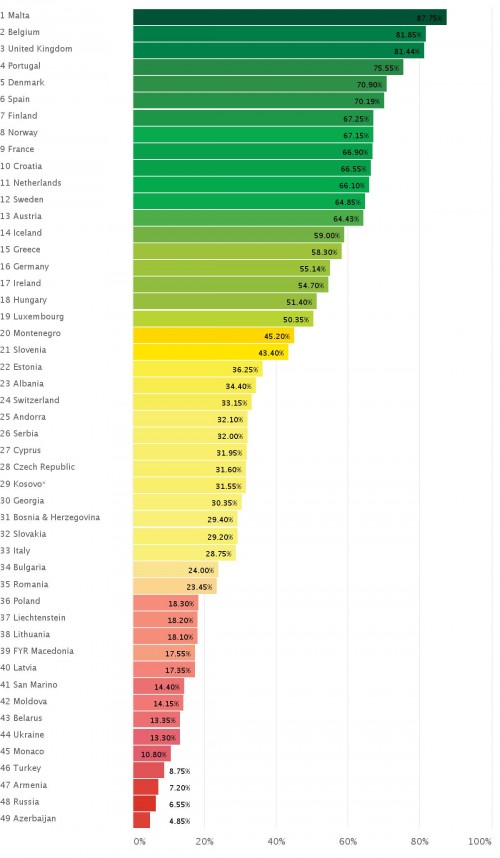
This rating is influenced by the Georgian legal system. On June 1st, 2000 Georgia adopted a law on the decriminalization of homosexual acts. In 2006, they adopted Article 2 (3) of the Labour Code of Georgia, which prohibits employment discrimination based on sexual orientation.
Also, according to amendments to the Criminal Code of Georgia in 2012, crimes against LGBT individuals based on their sexual orientation is an aggravating factor which should lead to a stricter sentence during the investigation. And the most important law, the “Anti-discrimination Act” which prohibited all forms of discrimination, including that of sexual orientation and gender identity, was adopted by the Georgian Parliament on May 2nd, 2014.
But of course, being a leader of the region does not mean that the problems within the country have been solved and that the LGBT community in Georgia feels protected.
A lawyer from the NGO “Center for Monitoring and Study of Human Rights” Lika Jalagania, has been doing research on the rights of the LGBT community for several years now. She speaks about the situation in the country in her recent work called “The state of LGBT rights in Georgia”, which was supported by the Boell Foundation.
Religion’s hostility towards the LGBT community
“The state deliberately denies the existence of hate crimes against members of the LGBT community. It is also the case when it comes to the statistics; let’s remember 17 May, 2013. Not only the LGBT community, but also the people who seemed related to the community have been subjected to abuse time and time again. After the gay pride parade on the 17th, only four people were detained and sentenced to an administrative fine of 100GEL, while the other four were sentenced under the Criminal Code of Georgia.
However, due to the fact that the prosecution supposedly did not provide enough evidence, the accused were released, including a priest who smashed the glass of a bus with a chair knowing that the participants of the parade were inside. We all remember these notorious events. It shows that the trial was biased. When we asked for statistics from the prosecutor’s office, the number of reported crimes committed on the grounds of homophobia or transophobia was reportedly zero. Although according to the data of our organization, in 2016 there were at least 10 cases that have been considered hate crimes”, said Jalagania.
When asked why the legislative norms do not work, the expert says that there are several pertaining to the law’s lack of effectivity.
First off, the police and the prosecution do not have adequate knowledge on how to identify a hate crime. They also lack sensitivity, and of course, there is no political will to foster it.
“The authority here is very patriarchal, and the country is now in a crisis of secularism. Homophobic statements made by the politicians and the ruling party are daily replicated in the media. The LGBT community is under daily terror. But the state simply doesn’t want to see that. “
According to Dzhagalaniya, the right of the LGBT community to organize meetings has been trampled as well.
“Any group of people has right to hold a rally on Rustaveli Avenue. Except the LGBT community. They say that you can do anything you want at home, but not in public. But even at home they are not safe and are often subjected to domestic violence. However, official statistics are silent on this issue as well, reporting 0 cases.
A recent survey conducted by NGO “Women’s Initiatives Support Group» (WISG) demonstrated that in a pool of 2000 individuals, 66.4% of respondents agreed that LGBT people should be prohibited from expressing themselves in public and they were in favor of introducing a law that bans public demonstrations for the support of LGBT members.
Why should the government be worried about God’s will…?
Lika Jalagania claims that a current problem in the political world is that politicians are trying to garner support for themselves in the pre – election period by making heavily homophobic statements.
“Priests and religious leaders intervene in the affairs of state. A good example of this was the introduction of a new school subject “Society and me”, developed by a number of different NGOs and the Ministry of Education. The aim of this subject was to teach children tolerance and acceptance. The Church stood against the subject, and the Minister of Education visited and consulted with them…Why should the government be worried about God’s will or what the church wants, and not be concerned about human rights?”, summed up Jalagania.
Azerbaijan
Why are you so soft?
Telman Badalov is 18 years old, and gay. When giving his consent for this interview, he said that there was no need for anonymity; he has nothing to hide.
Telman’s story begins in his childhood, when he realized he enjoyed playing with his sister’s dolls that were gentle and caring. He was very calm, polite, and therefore his mother’s relatives would often ask: “Why doesn’t your son play with other boys, doesn’t fight, why does he behave like a girl?”. His mom herself would ask: “Why don’t you fight with the boys? Why are you so soft? Why do you act like a girl?”
When Telman was 10 he was sexually abused by his teenage neighbor: “Of course, it didn’t bring me any pleasure. But I realized that there was something wrong with my reaction to it. I started reading books, speaking with my cousin, who knew more about this topic. And then I realized that I was gay. I tried to do everything to make my mother understand it. My father died when I was 13. It was only my mom who had to accept me the way I am. But, in spite of my behavior, she would humiliate me saying that I behave as a “disgusting gay.” I was treated with the same attitude at school by my classmates “, says Telman.
When Telman was 16 years old, he was tired of hiding, and he told his mother that he would like to wear earrings.
“She asked with horror:” What are you, gay?” and I said “yes.”
I continue to repeat it almost every day. I’m trying to explain her that it was not my choice, it’s my nature. It seems that my mother and sister finally accepted it. “
I am not friends with a gay person just because he is gay…
Telman did not hide his orientation, he was openly gay among friends, at school and on the streets: “In the beginning no one accepted it and I felt hated, ridiculed and humiliated by other people. But gradually I got used to … I learnt languages and computer programming so it was not hard to find a job. I am loved and respected for my character, work and knowledge …”.
Every day he goes through the struggle of trying to normally communicate with people, “You know, it is just awful when LGBT people communicate only with each other, closed in their own circle. The communication between people should occur from a fellow feeling, common views and interests. And not because of their sexual identity. I’m not friends with a gay person just because he is gay. “
In response to the question “what is it like to be an LGBT representative in Azerbaijan?”, we can provide two portraits. The first, the story of conceptual artist Babi Badalov, who had to flee the country because of a death threat against him and Isa Shahmarly, a member of the organization “Azad LGBT” who committed a suicide.
Artist Babi brought his paints to France. Isa, however, hanged himself on the rainbow colored flag. In both cases, a country called Azerbaijan could not “take” these bright colors.
Babi Badalov was born in the province of Lerik, in a large family. He could not even imagine “coming out” to his parents or numerous brothers and sisters: “For them it would not only be horrible but also some sort of another universe. They learnt about me very late, when I was already well over thirty. My brothers and nephews wanted to kill me. I actually ran out of the country … ” says Badalov.
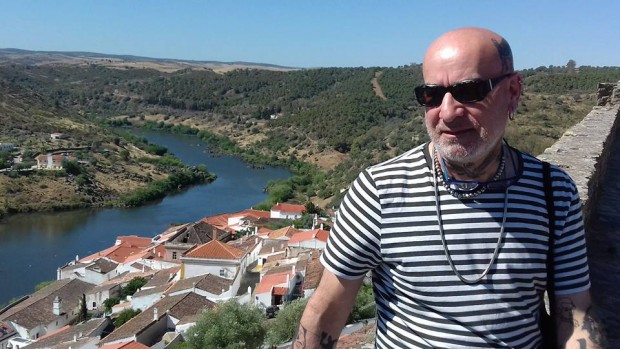
Although same-sex relations were decriminalized in the country in 2000, society is still not ready to accept the members of the LGBT community. Samad Ismailzade – the chief editor of the first LGBT profiled magazine «Minority», says that before the death of Isa Shahmarly, many people did not feel really feel the difficulties homosexuals face in the country: “Isa’s suicide basically opened my eyes. I realized that Isa was brought to suicide by people that were close to him because they didn’t understand what was happening. Just like the rest of the society. They do not have the right information. They think that it is a whim, an extravagance, a desire to stand out …”.
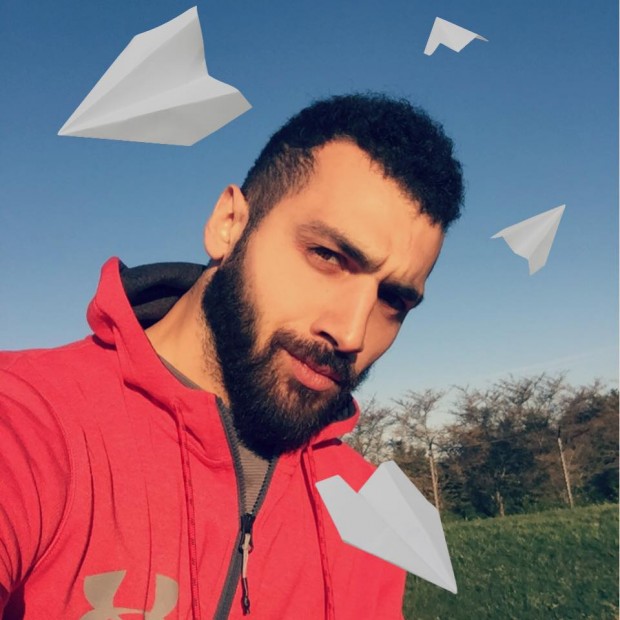
Samad says that sometimes some of the media writes about the LGBT community in an unacceptable manner to increase their ratings. But even that kind of information and articles somehow teaches the society that there are such people, and that’s okay: “It’s funny, the situation in our country is that we have to be happy even with homophobic articles…at least it calls attention to our existence.”
Religious judges call witnesses not to testify about the act
Of course, there is also the religious factor in the country. According to statistics, 96% of the Azerbaijani population is Muslim. Theologian Niam Agil says that homosexuality is banned in Islam (haram). The reason for that is the Quranic parable of the people of Lut. In some Islamic countries (Saudi Arabia, Iran, etc.) even the death penalty is proscribed for individuals engaging in same – sex acts.
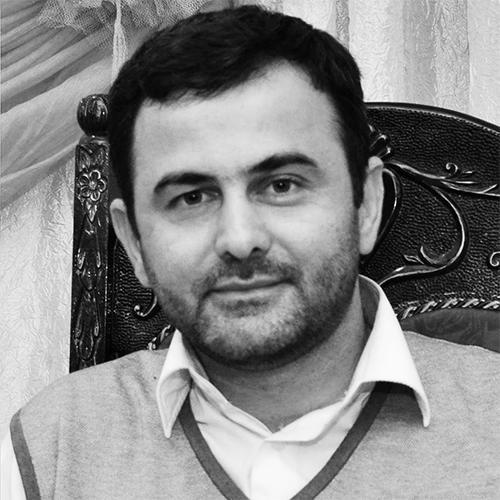
“Islam actually punishes homosexuality, but for that we need witnesses to the act. However, the Quran and religious judges call witnesses to not testify to the act because instead of the death penalty, they prefer to treat those people and return them to their natural state. “
LGBT representative may adopt a child alone, but not with a partner
Azerbaijani law allows marriage only between a man and a woman. Lawyer Fariz Namazly says that there is an interesting point in the law system: “By law, every citizen can adopt a child. His sexual identity cannot be the deciding factor in this matter. But the law prohibits the act of adoption registered by two gay men wanting to be parents. That is, parents must be of the opposite sex. This means that an LGBT person can adopt a child alone, but not with a partner …” explains the lawyer.
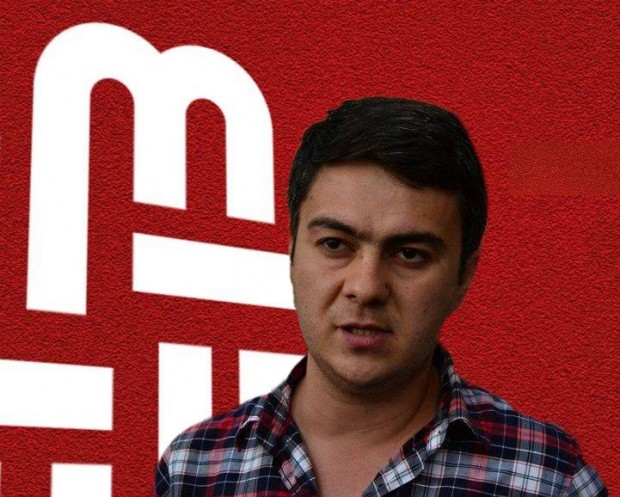
Also, it is hard to understand the law on registration of organizations of the LGBT profile. While there are no restrictions in the law, in fact, neither one of the three existing Azerbaijani LGBT organizations are taken into account.
Chairman of the NGO “LGBT Alliance Nefes-Azerbaijan” Javid Nabiyev, who emigrated from the country a few years ago, said that the State has registered one single LGBT organization called “Gender and Progress”. This is an organization which is “under the protection” of the State. Requests of other organizations that are trying to register their activities are rejected and ignored by the relevant authorities.
“We have sent a request twice. Called for months. They either do not respond to us at all or make obscene jokes, saying “how did you meet another founder?” As a result, there is no registration. Therefore, the existing few LGBT organizations are considered “illegal”, which deprives them of a lot, including financial support from international organizations”, said Nabiyev.
It is impossible to live happily, when you are surrounded by so much hatred
The negative attitude of society demoralizes LGBT people in the fight for their rights. There is basically no support and people that are acting openly threaten their work, life and the future. Ismailzade Samad said that the editors of the magazine receive numerous stories, from which they draw conclusions about what it is like to be a representative of the LGBT in the country: “This is a very unfavorable country for LGBT people. They can hide themselves for years and live well, in luxury or simply peacefully. But they cannot be happy. It is impossible to live happily, when you are surrounded so much hatred…”
LGBT persons are limited to working in beauty salons and sex services
Talking about the issue of the employment of members of the LGBT community, the opinions of Samad Ismailzade and Telman Badalov diverge. Samad Ismailzade says that from the numerous letters sent to their address, he learnt that many LGBT persons are limited to working in beauty salons and sex services and, at the best case, without revealing themselves, in the sphere of arts, music or cinema: “These are the” soft “areas for the LGBT community. They are not dominated by masculinity …. ”
Telman, however, insists that gay people can find work in any sector as long as they do not behave in a provocative or defiant manner: “The behavior of some LGBT people is not something that only angers people of a more… traditional sexual orientation, but me as well, despite the fact that I am gay myself. It is necessary to take into account the phobia of society, trying to show them good examples, so they can see that gay people are just as decent, adequate people with a sense of dignity and responsibility… and then they can find a job easily and earn respect”.
This article was written within the framework of the “Taboo topics of the South Caucasus” project, carried out with the support of the Prague Center for Civil Society.
Authors:
Azerbaijan: Gunel Movlud
Armenia: Gayaneh Mkrtchyan
Georgia: Edita Badasyan



